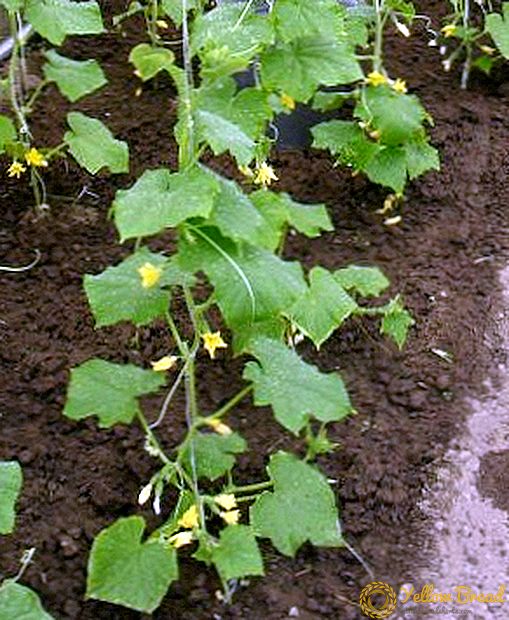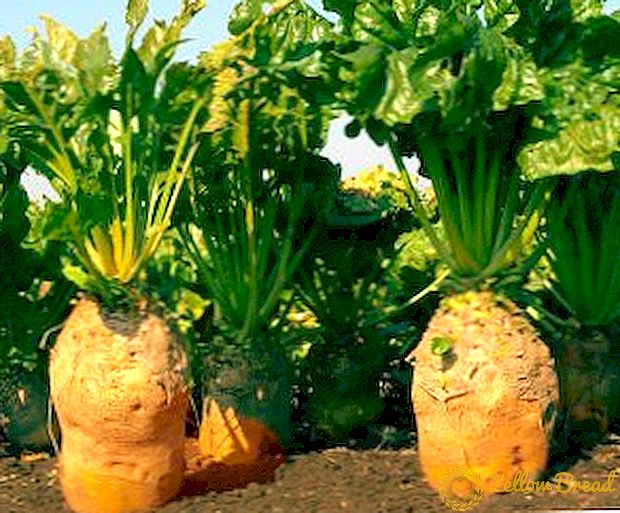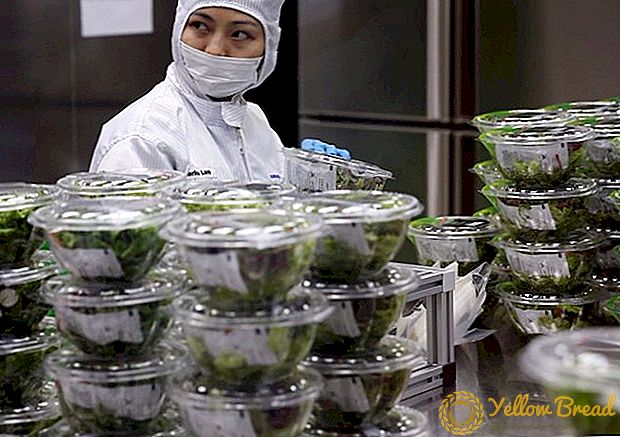
If 10 years ago, eggplants were considered to be something originally southern, even a delicacy, then today this culture is found in the mail on every bed.
And the thing is that having tasted its tasty flesh once, it becomes hard to deny yourself such pleasure.
Especially, if you have your own garden bed, where it seems that there is a special place left for planting eggplants.
Today we will just talk about the varieties of this plant, intended for cultivation in the open field, focusing exclusively on the best.
With us you will also learn what are the features of their landing and the most necessary rules of care.
What criteria must meet the varieties of eggplant, suitable for growing in open ground?
For this type of cultivation of eggplants, only those varieties that have very early ripening periods and high yields are well suited.
Eggplant with the best ripening may even produce seeds for sowing next year. In general, the characteristics of such varieties can be dwarf or medium-sized bush, with good branching.
Fruits can occur in completely different sizes and shapes, but the color is more often dark purple.Also, it is possible to grow in the same way and mid-season varieties, however, they will not have time to ripen to such an indicator that the obtained fruits can be harvested seeds. We will get acquainted both with the first, and with the second.
Cultivar eggplant "Balagur" - what will please and surprise?

We are used to the fact that only one single fruit is formed from the brush of an eggplant bush. But this variety will please us with a completely new type of fruiting - wrist.
Due to this, one brush pleases several fruits, most often their number is from 4 to 6. Thus, the bush is very heavily loaded with fruits: depending on the care and weather conditions, their number can be from 50 to 100.
The bush can reach a height of more than a meter; in no case should it be left without a support.
Thus, the variety is high-yielding, from an area of 1m2, you can easily collect from 6.8 to 7.2 kg of marketable fruits.
The fruits of this interesting variety of eggplants have a very unusual shape, similar to an ellipse. The color of them is also not quite familiar to this culture - rather intense bright purple.
At the same time, their skin is very thin, and the flesh under it is white, dense, and has very good taste.But, since a sufficiently large amount is formed on the bush and on the fruit hand, they do not gain much in weight over the entire growing season - only 80-130 grams each.
However, their length can vary from 10 to 17 centimeters, and the diameter indicator - from 3 to 6.
Reasons for which the eggplant variety described loves:
- The variety belongs to the early ripening, since the technical maturity of the fruits begins at 85 or 100 days after the first seedlings appear. Thus, having bought the seeds of this eggplant once, you can collect them for subsequent plantings.
- You can grow bushes of this variety not only in the open field, but also under the shelter or in the greenhouse. The bush in this case can be stretched even up to 1.3 meters in height.
- Falling of flowers, as well as the appeared ovary, is observed very rarely.
- There is a good resistance to the tobacco mosaic that is widespread in this culture.
- It shows high yields even at planting density of 5 plants per 1m2.
Eggplants "Vakula" - an excellent early ripe grade for an open ground

This variety is the result of the achievements of the Russian selection, the bush of which can even reach 2.2 meters in size, and not less than 1.2 (it stretches higher when grown in greenhouse conditions).
In fruiting gives a fairly high load on the bush, so it is strongly recommended to tie up.
Yield him unusually high - from 9.8 to 12.2 kilograms with an area of 1m2.
To obtain good yields, it is recommended to plant no more than 3-5 rasenia in the specified area.
Fruits of a grade of eggplants "Vakula" also differ in a beautiful ellipsoid form. However, their habitual color is dark purple, and the flesh is rather dense and white. Tastes especially distinguish this variety from a number of others.
The mass of fruits is also quite high - from 100 to 400 grams, which is why they are able to load the bush so much. It is also worth noting that the length of one eggplant can vary from 17 to 20 centimeters, and its diameter - 9-10 centimeters.
Merits varieties that you should definitely pay attention to:
- Very early ripening of fruits. Technical maturity comes already at 95-100 days.
- The crop is formed and ripens very evenly and at the same time, which greatly simplifies harvesting from the bushes.
- There are practically no thorns on the bush, which in turn facilitates care.
- The variety has good adaptability to different growth conditions, and not only in relation to open ground or greenhouse, but also in climatic regions.
We have already noted that bushes are often overloaded due to the abundance of crops and their simultaneous maturation. In this regard, eggplant "Vakula" requires a lot of attention, mandatory tying up and rationing of crop volumes.
Medium early variety of eggplant "Sancho Panza" and its most important characteristics

The yield of this variety is simply excellent, although in general it may not be as good as the previous grade. However, the advantage of "Sancho Panso" is that he simply huge fruitswhose weight can even reach 0.9 kilograms.
In general, the bush in this variety has average sizes, the maximum indicators of its height are 1.5 meters. It should be noted that the bush is weakly and practically has no thorns.
We have already mentioned the maximum weight of the fruit, but it is worth noting that on average, their weight is 0.5-0.6 kilograms. At the same time, they have a spherical shape, not familiar enough for eggplants.The skin is painted in a rich purple color, the flesh is white. Differs in good tastes.
pros cultivation of eggplants "Sancho Panso":
- Mid-term terms of ripening of fruits that occur after 120-130 days from the moment the first shoots of seedlings appear.
- Large sizes of fruits and their excellent presentation, taste.
- Universal purpose of eggplants of this grade which not only well are suitable for house cookery, but also for conservation.
- Resistance is manifested to diseases such as tobacco mosaic virus and spider mites.
- The variety can be grown without problems both in open ground and in the greenhouse way.
Considering the fact that this variety does not ripen at the earliest, but in the middle early period, its harvest constitutes exclusively fruits for human consumption. But seed maturity in some regions does not occur, and therefore the next year they will have to buy.
High-yielding and lying eggplant "Negus": a detailed acquaintance with the variety

This variety refers not only to the early varieties, but to the superearly varieties of eggplants. From the moment of the appearance of the first eggplant shoots to the onset of full technical maturity, only 70-90 days pass.
Bushes are very compact, reaching a height of only 50-60 centimeters.At the same time, if you plant a variety on an industrial scale, from 1 hectare it turns out to collect up to 45 tons of crop.
A feature of this variety is that with regular harvesting once a week, you can well affect the overall yield, as well as extend the growing season of the bush.
In size, the fruits on the bushes of this variety are not very large, but they have an advantage in another. They weigh about 150-300 grams, although quite a large amount of them forms on one bush.
The form they have barrel-shaped, rounded. Their outer color is intensely violet, and inside the flesh has a light white color. That is exactly the flesh deserves special attention, because although it is quite dense, it has a very delicate, pleasant taste.
What else lie dignity varieties:
- Super short time of ripening of fruits, allowing to grow a variety even in the northern regions.
- The possibility of self-harvesting seeds.
- Very high yield, as well as the suitability of the fruit to transport and long storage period.
- The ability to stretch yields for a longer time, constantly having fresh fruit.
- Well suited for all types of cooking and preservation.
Appearance is not quite familiar to eggplants, therefore, reduces their marketability. Although generally transported and they are stored very well.
Eggplant "Simferopol 12/105" - a miracle generated by the sunny coast of Crimea
Yield this eggplant variety very high, in which the bush plays a large role, with a characteristic growth capacity above the average.
Fruits ripen in the middle early period - in about 110-125 days of the growing season of the bush. However, this does not in any way diminish their merits and does not reduce the good qualities of the fruit.
Many people love these fruits very much for the reason that not only very large fruits, but also very beautiful in appearance. In particular, the weight of one eggplant on average can vary from 250 to 500 grams, which, however, can be increased by good and regular care.
Their form is no longer familiar - they can be either short-cylindrical or completely oval. They are painted in an unusually attractive reddish-purple color that visually complements the glossy shine of the smooth surface of the skin.
What is the value of the mid-described varieties described eggplant?
- Large sizes of fruits and their remarkable presentation.
- Good fruiting bush and fast maturity of the fruit.
- Eggplant varieties "Simferopol" are an indispensable basis for the preparation of caviar and stuffing.
The fruits of this variety have a very narrow purpose, they are absolutely not suitable for canning without prior treatment. Caviar obtained from them is not stored for a long time. Predominant use - cooking immediately after harvest.
What are the features of planting eggplant in the open ground: get acquainted with the process
Despite their similarity and affinity with many garden plants, when planting eggplants, the following features should be considered:

- This culture is thermophilic, because it came to us from the south. Heat is especially needed for pollination, during which the temperature should not be below + 20ºС.
- Seedlings are planted only when the threat of frost is completely passed. Mature plants are also afraid of the cold.
- Eggplants do not tolerate a lack of water.
- Plants should be abundantly lit by the sun, but only 12 hours a day.
- The soil should be selected with high fertility, as well as well-sifted, light.
- As precursors on the bed with eggplants should be carrots, onions, beans, early cabbage, melons. Can not be planted after tomatoes or peppers. Eggplant can be grown in the same place only once in 3 years.
When planting this culture is very important carefully soil the soilotherwise, the plant and its root system will be difficult to grow.
Also, before planting, a bed is not only very deeply dug, but a large amount of fertilizer is also introduced into it, the advantage of which is given to peat and humus. It is not necessary to make a bed wider than 1 meter, and its height should be about 30 centimeters.
Before the direct planting of eggplant seedlings, the bed is treated with a hot mullein, which can also be replaced with fertilizer "Effecton".
Sowing seeds for seedlings are usually carried out in boxes, which are contained in the house or in the greenhouse. However, you can sow them right on the garden bed, just keep it under the film all the time.
Seeds are sown around mid-March, but depending on the variety, they may shift slightly.
Planting eggplant seedlings in open ground should be carried out only with the arrival of this heat, when the air temperature does not fall below + 15ºС. This is usually the period from May 25 to June 10.
Choosing a scheme for planting you need to take into account the size of the bushes, because for the smallest you can leave a distance of 30 centimeters, and for the largest and highest - even 50.
Row spacing must be appropriate - from 60 to 80 centimeters. In no case should thicken plantings, because it will lead to lower yields.
The main aspects of the care of eggplants: get acquainted and learn
- It is impossible to allow soil compaction, it must be constantly loosened, especially after heavy rainfall.
- Watering necessarily provided abundant, drying is not allowed. Water for irrigation is heated in the sun.
- During the season, the bushes are fed 3 times. It is best to use slurry for this purpose, which can be replaced by chicken manure or mineral fertilizers.
- Weeds need to constantly weed and make sure that there are no diseases or pests on the plants, to deal with them in a timely manner.
- Bushes it is important to constantly pile up and tie up,which positively affect their growth.
- It is best to build film arches over the bed, on which to stretch the film at night. This will save the plants from hypothermia.






